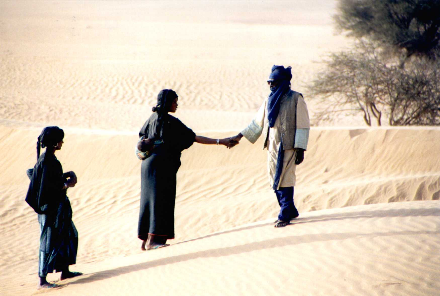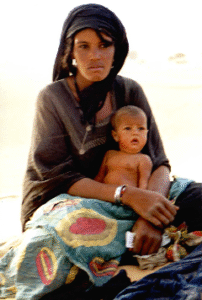Not sure what I was thinking when I wrote this poem. Apart from the last two lines of each verse it begins in a form of prose and ends up a rhyming poem. Oh well, who’s to judge?
One thing I do know. They are lovely people. One woman came over to me. She lay a blue cloth on the sand and on it, she placed a few articles of jewelry, that she had made. She sat on one side of the cloth with her baby in her arms and invited me to sit opposite her. I had learnt how to say “How much?” in Tamashek, her language, and she replied by displaying her hands and fingers. We sat for a while in silence, just gazing at each other, talking without words. I gave her an energy bar of seeds and raisins that I had brought from home. She smiled and tucked it away in her tunic for later.
Tuareg Lady
In the harsh desert conditions
of the Aïr mountains,
where no man meets a nomad,
life…
and death…
appear from no where.
In the Aïr.
And the life
that appears
is often a young lass
and her child.
Her husband –
on the move,
in a caravan,
so far away.
That’s their way.
You stop your truck
to fetch wood
for the evening camp fire,
after so many hours
of lone travel,
along the Piste,
and you think that no-one else exists.
And then she comes,
unannounced, no song, no drums.
She stands,
proud,
with her child on her arm,
a little to one side,
and waits.
This is not the oppression
of a creature lower than man.
This is respect,
and protocol.
For she will be greeted
and asked,
what she might need:
the Tuareg breed.
And the handshake –
a ritual
of minutes.
A symbol of caring,
sharing,
respect,
and the love
of a heaven above.

After the greetings
she may smile
and look down,
coy.
Hahmdi,
our leader,
would ask how her children are
and she would say
what was on her mind
and what she really did need,
without any greed.
For her existence
was meager.
Yet,
as long as there was no drought
she was never without.
But without is a relative word.
For what she had
would, for you and I,
be poverty,
disaster,
even disgrace.
Yet her life is fulfilled,
natural,
and free.
Not like you and me.
She would never beg,
never steal,
but would accept
what we had,
to offer.
She would not ask
but would point out her need,
starting with her child…
and its health…
nothing to do with wealth.
Perhaps the baby’s eyes were sore,
or a rash on his arm,
or a gash on its leg.
Medicine would be gratefully accepted
and no more asked.
And, if it should chance,
that we do not have the right cure
she would accept with a smile –
a sight worth while.
For, when our caring is done,
before we say goodbye
I see her face.
almost white
with the style and pride of the Berber
in the north.
She is a beauty,
with skin so pure,
and a stance that is sure.
Her presence
fills the desert
and her charm says:
this is my life,
for I am the wife
of a Touareg nomad
and he is on his way,
home.
This is how we live
and God we forgive.
Even though our age
averages out to fifty
because of the many children
that die.
We never ask why.
For we are proud:
as erect as I stand
on this marvelous land.
I have no fears
and never count the years.
Life is as it comes
and when God beats his drums
it will rain
then once again
my Korry will bring water
and my daughter
will have a chance to survive,
to stay alive.
And the valley will explode
into a fertile road
where we will come and go,
where my children can grow.
And when it dries
from the baking skies
that’s just Allah’s way
and we must pray
our thanks to the one
that provided the sun
that shines on our land
which is forever grand,
noble and pure
and, to be sure,
we Touareg
would never beg
to be in any other place
nor to be another race.
And, as she walks away,
I know I’ll never forget the day,
that I met a lady of Aïr
who showed me how to care
for the real things in life.
Why do we make such strife?
Copyright © 01.06.1998 – Kevin Mahoney

